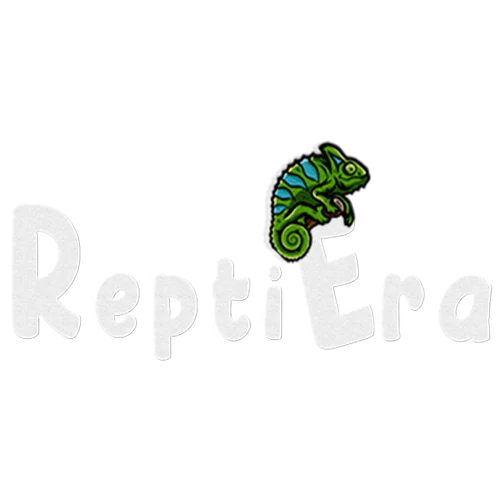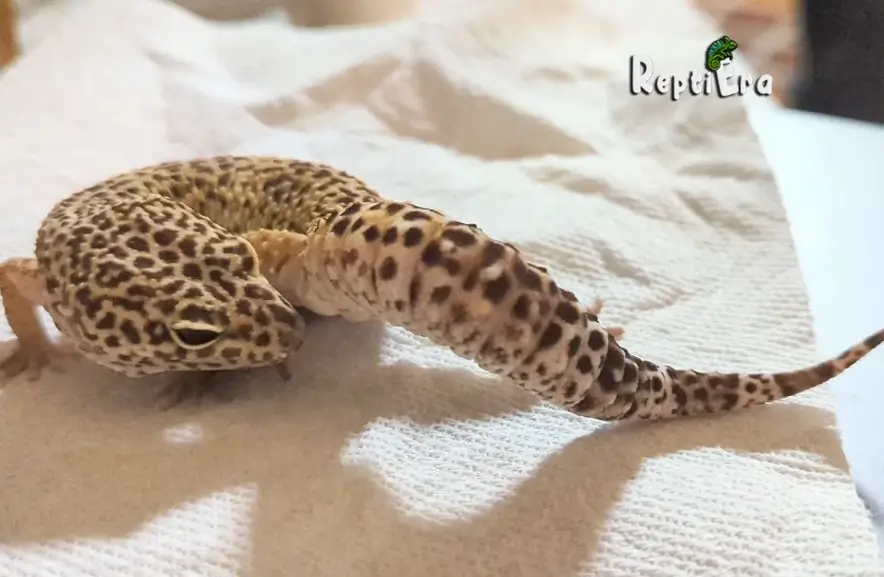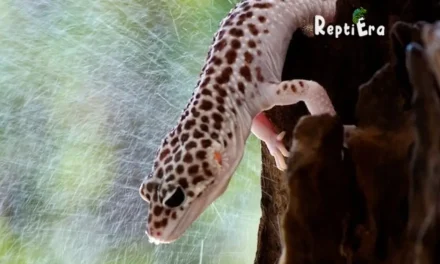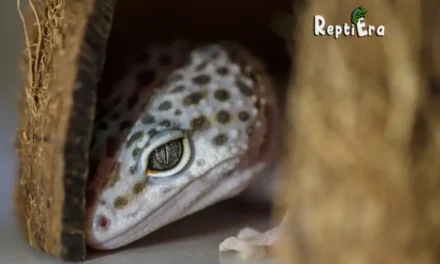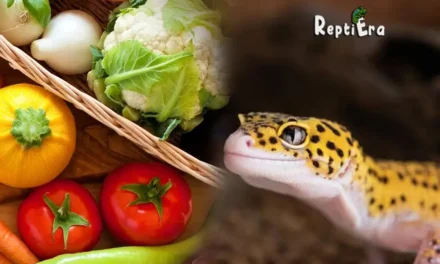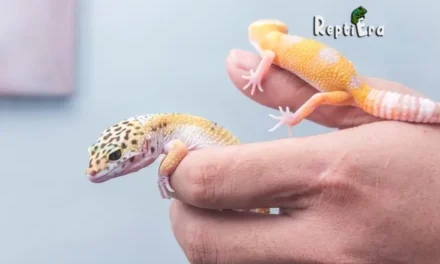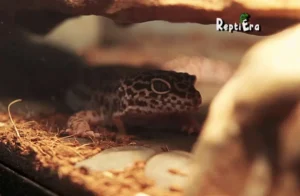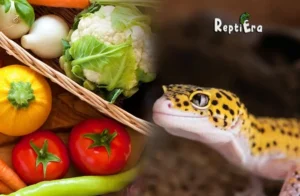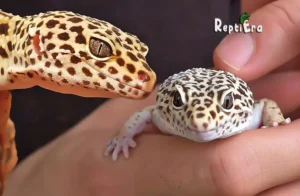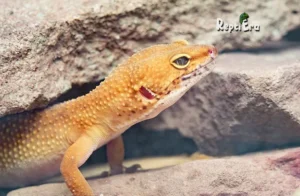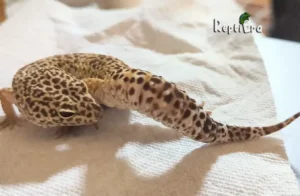As an owner of a leopard gecko, you might find their behaviour sometimes unfamiliar and stressful. Despite being relatively easy to take care of, leopard geckos can surprise you by doing different things that might cause worry. One such activity is licking their vents.
This licking behaviour, though it might seem difficult to handle at first, is a natural part of their grooming process. These reptiles are known to lick their vents occasionally, which is an essential aspect of their hygiene. It’s not uncommon to see them licking at various times, especially after defecating or when shedding their skin.
Understanding this behaviour is key to maintaining and keeping up with the well-being of your pet gecko.
Table of Contents
Why Is My Leopard Gecko Licking His Bum?
If your leopard gecko is licking its bum and it’s driving you crazy, consider the context: is it just walking around its tank, eating, or perhaps doing it at night just after it wakes up from a nap? This behaviour is a normal part of their grooming routine.
What Causes A Leopard Gecko To Lick Its Vent?
Ever seen your leopard gecko licking its vent and felt a mix of curiosity and concern? This is a normal behaviour in the world of reptile care, so there’s no need for a reptile owner to recoil in disgust or rush to the nearest reptile vet. Most causes of this behaviour are benign, like the need to clean themselves after shedding or defecating.
Unlike mammals, geckos and other reptiles lack the ability to clean their anus area as efficiently as humans, who have opposable thumbs. This makes it harder for the animals to stay clean, so they have to get creative, often licking themselves to bathe. It’s a common sight, especially in female geckos around the time of laying eggs, to ease pain or secretions. Meanwhile, males might do it while marking territory, using a liquid, wax-like substance as a signal that they are ready to mate.
Another reason might be constipation or impaction, where the gecko licks to lubricate the area to make it easier to defecate. If your pet hasn’t had a bowel movement in several days, a warm bath or a little olive oil around their mouth might get things moving. These treatments can often help, but if they don’t, veterinary intervention may be necessary.
As an expected part of owning either a male or female gecko, when you see them engaged in this behaviour, if it bothers you, just look away. They’re just doing what they need to to clean themselves in privacy. It’s a normal, if sometimes revolting, aspect of their care and maintenance.
Causes: Licking After Defecation
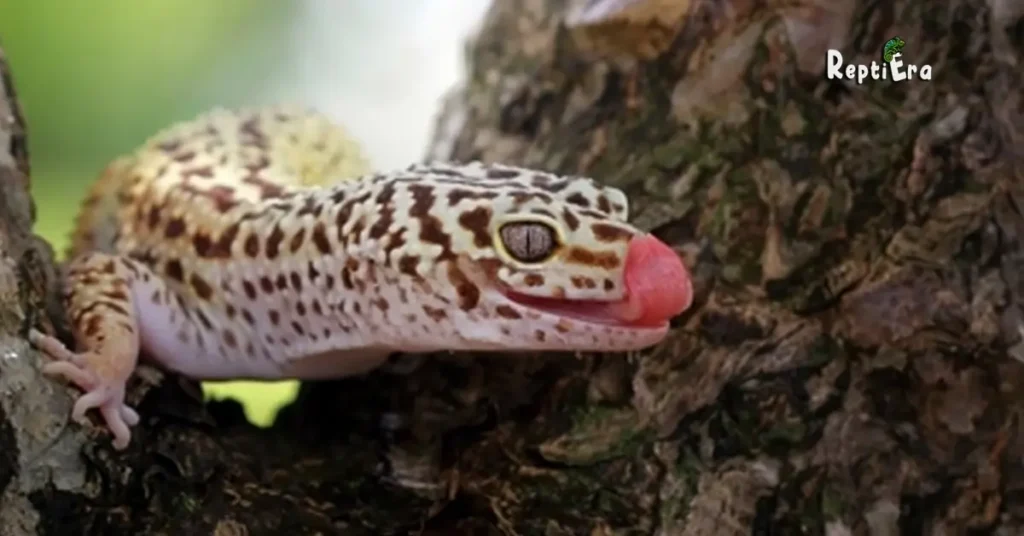
Observing leopard geckos engaging in the behaviour of licking their vents can be puzzling for owners, but it’s essential to understand the reasons behind this habit. These reptiles are incredibly clean animals, and licking their vents is a natural way to tidy themselves after a bowel movement. While it may appear nasty to us, this behaviour is a necessary hygiene practice for them.
As an owner, being concerned about the sanitary steps your pet takes is natural, especially considering the risk of spreading germs. It’s crucial to keep your hands clean after touching or handling your gecko to prevent any disease transmission. Despite their cleanliness, leopard geckos, like many pets, carry bacteria like salmonella in their guts, which has numerous strains. While the geckos are typically immune to their strain, humans are not, raising the risk of catching something and feeling sick, crummy, or sluggish.
Moreover, considering the different immune systems in children and the elderly, the severity of symptoms can vary, sometimes requiring professional help to combat viruses and other diseases. This is why sanitizing, wearing gloves, and thorough scrubbing with soap are vital after interacting with your pet. It’s easy to be forgetful about these practices, but they are essential to prevent you or others from falling ill. Remember, your leopard gecko’s licking habit, although seemingly unsanitary, is a vital part of their self-care routine to keep themselves clean and reduce the risk of any health issues.
Causes: Shedding
One of the common causes of vent licking in leopard geckos is related to shedding. Unlike some reptiles, like bearded dragons, leopard geckos can find shedding a bit more painful or uncomfortable. During this time, which can last hours or even all day, they try to rid themselves of their old skin.
This skin comes off in pieces, rather than in one large piece, creating a patchwork effect across their head, neck, back limbs, and tail. The geckos may become anxious to remove this old skin and may aggressively tug at it, especially around sensitive areas like the vent. To soothe the itchiness and discomfort, they often lick their vent area, trying to loosen any skin that’s not fully removed.
If the skin becomes stuck, particularly around the feet or tail, the gecko might rub against surfaces in their enclosure to help peel it off. This is a natural process for them, though it might seem gross to us. As owners, our role is to ensure their care and intervention when necessary. If shedding skin is stuck, providing a warm bath and gentle massage can greatly help them remove it without causing harm.
Causes: Constipation/Impaction
A reasonably typical reason for a gecko to lick its vent is related to defecating. It may seem revolting, but it’s a normal part of owning these animals, much like cats and dogs that clean themselves. Most leopard geckos defecate in the same spot within their enclosure, often choosing a quiet, isolated spot to sit for seconds or minutes during this behaviour. This action, while part of their daily activities, is expected and typically doesn’t require help or intervention from a vet unless there are signs of constipation or impaction.
In cases of constipation or impaction, the licking might be an attempt to clean the area or relieve discomfort. This behaviour is especially common post-shedding to prevent infection from any shedding skin sticking around the vent. If you notice your gecko struggling with defecation or this behaviour becomes excessive, it’s best to leave the more serious intervention to a veterinarian.
Causes: Cleaning Post-Egg Laying (Females)
Among the lesser-known reasons why a gecko might lick its vent is when a sexually mature female needs to clean herself after laying eggs, a time and energy-consuming process. This behaviour helps to ease the pain and discomfort that a female leopard gecko experiences post-laying, whether she’s been paired with a mate to produce a clutch of eggs or even if they’re infertile. As the gravid period passes, the licking helps to lubricate the area and provide comfort, removing any residue. In some cases, if the discomfort persists or seems severe, she might need additional help, but generally, this is not a cause for worry.
Causes: Internal Parasites
Finally, leopard geckos may lick their vents to ease pain caused by parasite infestation, though this is seen in rare cases. Intestinal parasites, such as pinworms, coccidia, or cryptosporidium, can infect geckos, making them susceptible to a wide range of symptoms. If you observe excessive licking, it’s important to rule out the possibility of internal parasites as a cause.
Geckos that are infected usually exhibit these symptoms along with vent licking:
- Rapid decrease in weight
- Lack of appetite or complete disinterest in food
- Efforts to regurgitate or vomit consumed food
- Diarrhea or excessively loose stools
- Noticeable reduction in tail fat and other essential fat reserves
If you notice symptoms of your gecko licking its vent more often, it’s a good idea to consult a reptile vet or veterinarian. They can take a stool sample to confirm the presence of any parasites and prescribe appropriate medications to flush out the system and eliminate these unwelcome intruders.
Licking After Marking Their Territory
In the fascinating world of leopard geckos, observing their behaviours can offer insights into their unique lives. As territorial creatures, they often mark their territory, especially in a shared tank or enclosure. This behaviour is crucial for establishing themselves as the rulers of their domain. The process involves secreting a waxy substance from specialized pores near the vent area. This wax serves as a marker, signalling their presence to other geckos. Interestingly, both male and female geckos engage in this ritual, with males often doing so to assert dominance or attract a mate, and females indicating their readiness to mate.
These secretions, while a natural part of their behaviour, can sometimes harden and accumulate around their vents. Leopard geckos, being clean animals, will lick these areas to clean themselves, removing any droppings or peeling secretions. This action is generally harmless, but in some cases, owners may need to provide assistance. If the wax build-up becomes excessive, gently removing it with a cotton swab and warm water can help. It’s important to separate geckos if there’s a risk of them fighting over territory, ensuring each gecko can comfortably establish itself without conflict.
With that said, I recommend checking this tank out here from Amazon. If two leopard geckos of the same or opposite sex are paired together in an enclosed area for too long then eventually one of the geckos could end up gravid (pregnant) or potentially lose their life due to aggression from fighting over territory.
Keeping Clean
Leopard geckos are clean by nature, and often seen licking their vents—a behaviour that might seem surprising at first. If you’ve ever wondered why they do this, it’s akin to cats and dogs keeping their fur free from dirt that gets trapped and matted. For leopard geckos, it’s about maintaining the cleanliness of their skin, especially around the vent area.
These reptiles usually poop in a designated spot within their tanks, showing a level of cleanliness not often associated with other animals. By licking these body parts, they reduce the risk of getting dirty. This effort is also part of their territorial behaviour, as they lick to clean areas they have marked as their territory, maintaining a pristine environment in their own unique way.
Should You Be Worried If Your Gecko Licks Their Vent?
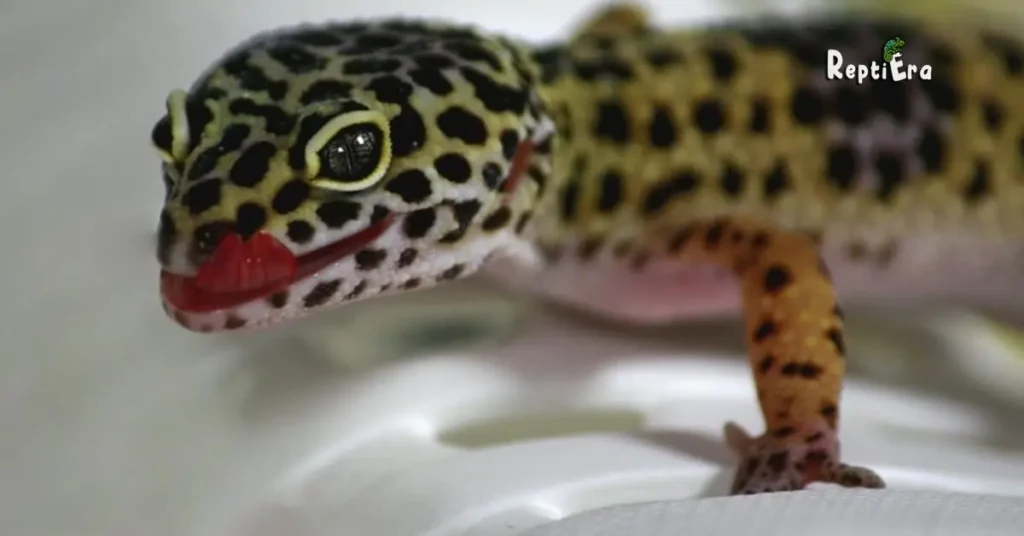
In the majority of cases, there’s no reason to worry when you see leopard geckos lick their vents; it’s typically normal and part of their cleaning process. However, if you observe troublesome symptoms like those mentioned with impaction or parasites causing your gecko to lick more often than usual, it’s advisable to seek veterinary advice.
Keep an eye out for symptoms such as:
- Abrupt decrease in weight
- Difficulty in passing stools
- Reduced interest in eating
- Frequent loose stools
If your gecko shows unusual symptoms that don’t resolve independently within a few days, it’s prudent to consult a reptile vet. They can determine the cause, provide an official diagnosis, and outline a treatment plan for moving forward.
Do Leopard Geckos Groom Themselves?
In their way, yes, vent licking is part of the grooming regimen of a leopard gecko. Their body is uniquely designed for self-grooming, especially when they shed the top layer of their skin every couple of months. Babies do this often, as they grow quickly at this stage of life, whereas juveniles and adults shed less frequently as they age. In addition to shedding, leopard geckos also clean themselves during and right after the shedding process.
Leopard geckos do lick the air.
Leopard geckos, known as lickers, often lick the air as well as their skin to cool down or clean themselves. It’s not just about grooming; they also use their tongue to explore their environment and expect everything in sight, including potential food sources. This behaviour is a natural part of their interaction with their surroundings.
Your leopard gecko might have mites.
If you notice your leopard gecko licking excessively, it might be dealing with mites, a common problem often transmitted through its habitat. If infected, you should inspect the bedding and other items in your household where your pet lizard resides. To get rid of mites, clean all supplies, including bowls and dishes, with hot water and soap or detergent, and rinse thoroughly. Be vigilant for signs of mold or black spots growing on bedding or drinking items; if contaminated, these should be thrown away to prevent your gecko from ingesting any harmful spores. Regular and thorough habitat cleaning is crucial to keep these pests at bay.
FAQs
Are there any medical conditions why they lick their butt?
While there are no definitive answers as to why leopard geckos lick their bum, it’s speculated that the reasons range from grooming to managing parasites. If the licking behaviour becomes excessively frequent, it could indicate a medical condition, warranting a visit to a veterinarian to rule out any health issues. Additionally, this action might be a sign of territorial marking, where they use scent to identify their home range and inform other leopard geckos about the area they have occupied.
Is there anything I can do to stop my leopard gecko from licking his butt?
Don’t worry, it’s normal for leopard geckos to lick their butts; it’s a way to clean off dirt and debris that may get stuck on their skin. If you’re concerned, there are things you can do to help: maintain a clean cage, provide fresh water at all times, and occasionally give a gentle bath or soak to wash away any grime. Also, ensure a nutritious diet to boost their immune system and keep them from getting sick.
What does a leopard gecko licking mean?
Typically, when a gecko or any lizard licks, it’s akin to smelling like a snake or dog, using their tongues to explore their surroundings, much like they poke their nose or mouth to think and greet. If you see them suddenly licking in front of them, it’s just their way of sensing their environment.
Why is my leopard gecko flicking his tongue?
Small as they are, lizards use a flick of their tongues to engage their olfactory organ and enhance their sense of smell, helping them understand their environment.
Why is my leopard gecko licking his tank?
Geckos often lick their tank to explore their surroundings, including their water bowl; it’s normal behaviour, especially if they’re adjusting to a new environment or feeling dehydrated.
Should I wet my leopard gecko?
Additional soaks in a shallow container of warm water for 15-20 minutes, 2-3 times a week, can be helpful during the shed; however, don’t force soak them, as geckos typically do not go to water on their own.
Conclusion
If you’ve noticed your leopard gecko licking its vent, it’s typically a harmless and natural behaviour aimed at keeping themselves clean. These reptiles are clean animals by nature, often engaging in such actions to stay clean, similar to how we take a bath. However, while often safe, if this licking becomes excessive or appears worrisome, it’s crucial to get it checked. One of the reasons could be impaction, a common but treatable issue in leopard geckos, where something gets impacted in their digestive tract. Although this can turn into a serious situation if left unnoticed, with the proper steps and care, your gecko can continue to lead a healthy life.
